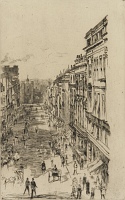Etchings Institutions search term: grolier club
St James's Street | ||
| Number: | 178 | |
| Date: | 1878 | |
| Medium: | etching and drypoint | |
| Size: | 275 x 155 mm | |
| Signed: | butterfly at lower left (3-final) | |
| Inscribed: | no | |
| Set/Publication: | no | |
| No. of States: | 4 | |
| Known impressions: | 36 | |
| Catalogues: | K.169; M.165; W.140 | |
| Impressions taken from this plate (36) | ||
PUBLICATION
 ).
).15: Athenaeum, 6 July 1878, p. 25.
16: Pennell 1908 , p. 215.
17: Whistler to E. H. Yates, 3 and 10 July 1878, GUW #11383; reprinted in Whistler 1892 .
EXHIBITIONS
 ). 18
). 18
It also appeared in print dealers' shows, at H. Wunderlich & Co. in New York in 1898 and 1903 and at F. Keppel & Co. - with an impression from the collection of Mortimer Luddington Menpes (1860-1938) - in 1904. 19 Charles Lang Freer (1856-1919) bought a final state from the 1898 Wunderlich show (
 ).
).18: Leipzig 1895 (cat. no. 805); Chicago 1900 (cat. no. 122). See REFERENCES : EXHIBITIONS.
19: New York 1898 (cat. no. 119); New York 1903b (cat. no. 140).
20: New York 1904a (cat. no. 141); Boston 1904 (cat. no. 106); London Mem. 1905 (cat. no. 140).
SALES & COLLECTORS
21: 1-10 July 1878, GUW #03562.
 ). In the sale at Sotheby's, 3 March 1892 (lots 221 - 4) sold for £2.7.0, £1.18.0, £2.2.0, £1.8.0, the first two to the New York print dealer, Frederick Keppel (1845-1912), and the others to Welbore St Clair Baddeley (1856-1945) and 'Harrington' - probably Henry Nazeby Harrington (1862-1937). Charles Lang Freer (1856-1919), bought a first state in 1892, possibly the one from that sale, from Keppel for $60 (
). In the sale at Sotheby's, 3 March 1892 (lots 221 - 4) sold for £2.7.0, £1.18.0, £2.2.0, £1.8.0, the first two to the New York print dealer, Frederick Keppel (1845-1912), and the others to Welbore St Clair Baddeley (1856-1945) and 'Harrington' - probably Henry Nazeby Harrington (1862-1937). Charles Lang Freer (1856-1919), bought a first state in 1892, possibly the one from that sale, from Keppel for $60 ( ), and a fourth state (originally from the collection of Francis Seymour Haden, Sr (1818-1910)) through Wunderlich's in 1898 (
), and a fourth state (originally from the collection of Francis Seymour Haden, Sr (1818-1910)) through Wunderlich's in 1898 ( ). 22
Bryan Lathrop (1844-1916) acquired a third state that had been Hutchinson's (
). 22
Bryan Lathrop (1844-1916) acquired a third state that had been Hutchinson's ( ).
). 22: Keppel to Freer, 17 September 1892, FGA 1892-6646.
 ).
). ); Bernard Buchanan MacGeorge (1845?-1924), and through Wunderlich's to Henry Harper Benedict (1844-1935) (
); Bernard Buchanan MacGeorge (1845?-1924), and through Wunderlich's to Henry Harper Benedict (1844-1935) ( ), who also owned (
), who also owned ( ); Samuel Putnam Avery (1822-1904) (
); Samuel Putnam Avery (1822-1904) ( ); Charles Deering (1852-1927) (
); Charles Deering (1852-1927) ( ); Harry Brisbane Dick (1855-1916) (
); Harry Brisbane Dick (1855-1916) ( ); James A. McCallum (1862-1948) (
); James A. McCallum (1862-1948) ( ); Ralph King (1855-1926) and his wife (
); Ralph King (1855-1926) and his wife ( ).
).
